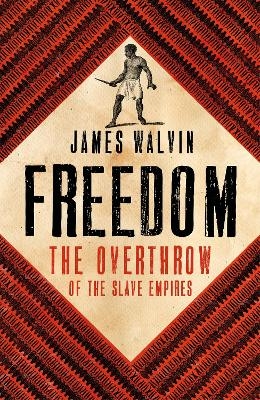
Freedom
The Overthrow of the Slave Empires
Seiten
2019
Robinson (Verlag)
978-1-4721-4143-9 (ISBN)
Robinson (Verlag)
978-1-4721-4143-9 (ISBN)
'Long before the friends of African freedom began to agitate for black freedom, the enslaved themselves had created their own strategies of resistance. In time, their defiance was to prove the crucial final factor in bringing down slavery itself.' James Walvin, in Freedom
In this timely and very readable new work, Walvin focuses not on abolitionism or the brutality and suffering of slavery, but on resistance, the resistance of the enslaved themselves - from sabotage and absconding to full-blown uprisings - and its impact in overthrowing slavery. He also looks that whole Atlantic world, including the Spanish Empire and Brazil.
In doing so, he casts new light on one of the major shifts in Western history in the past five centuries. In the three centuries following Columbus's landfall in the Americas, slavery became a critical institution across swathes of both North and South America. It saw twelve million Africans forced onto slave ships, and had seismic consequences for Africa. It led to the transformation of the Americas and to the material enrichment of the Western world. It was also largely unquestioned. Yet within a mere seventy-five years during the nineteenth century slavery had vanished from the Americas: it declined, collapsed and was destroyed by a complexity of forces that, to this day, remains disputed, but there is no doubting that it was in large part defeated by those it had enslaved.
Slavery itself came in many shapes and sizes. It is perhaps best remembered on the plantations - though even those can deceive. Slavery varied enormously from one crop to another- sugar, tobacco, rice, coffee, cotton. And there was in addition myriad tasks for the enslaved to do, from shipboard and dockside labour, to cattlemen on the frontier, through to domestic labour and child-care duties. Slavery was, then, both ubiquitous and varied. But if all these millions of diverse, enslaved people had one thing in common it was a universal detestation of their bondage. They wanted an end to it: they wanted to be like the free people around them.
Most of these enslaved peoples did not live to see freedom. But an old freed man or woman in, say Cuba or Brazil in the 1880s, had lived through its destruction clean across the Americas. The collapse of slavery and the triumph of black freedom constitutes an extraordinary historical upheaval - and this book explains how that happened.
In this timely and very readable new work, Walvin focuses not on abolitionism or the brutality and suffering of slavery, but on resistance, the resistance of the enslaved themselves - from sabotage and absconding to full-blown uprisings - and its impact in overthrowing slavery. He also looks that whole Atlantic world, including the Spanish Empire and Brazil.
In doing so, he casts new light on one of the major shifts in Western history in the past five centuries. In the three centuries following Columbus's landfall in the Americas, slavery became a critical institution across swathes of both North and South America. It saw twelve million Africans forced onto slave ships, and had seismic consequences for Africa. It led to the transformation of the Americas and to the material enrichment of the Western world. It was also largely unquestioned. Yet within a mere seventy-five years during the nineteenth century slavery had vanished from the Americas: it declined, collapsed and was destroyed by a complexity of forces that, to this day, remains disputed, but there is no doubting that it was in large part defeated by those it had enslaved.
Slavery itself came in many shapes and sizes. It is perhaps best remembered on the plantations - though even those can deceive. Slavery varied enormously from one crop to another- sugar, tobacco, rice, coffee, cotton. And there was in addition myriad tasks for the enslaved to do, from shipboard and dockside labour, to cattlemen on the frontier, through to domestic labour and child-care duties. Slavery was, then, both ubiquitous and varied. But if all these millions of diverse, enslaved people had one thing in common it was a universal detestation of their bondage. They wanted an end to it: they wanted to be like the free people around them.
Most of these enslaved peoples did not live to see freedom. But an old freed man or woman in, say Cuba or Brazil in the 1880s, had lived through its destruction clean across the Americas. The collapse of slavery and the triumph of black freedom constitutes an extraordinary historical upheaval - and this book explains how that happened.
JAMES WALVIN is the author of many books on slavery and modern social history. His book, Crossings, was published by Reaktion Books in 2013. His first book, with Michael Craton, was a detailed study of a sugar plantation: A Jamaican Plantation, Worthy Park, 1670-1970 (Toronto, 1970). He became a Fellow of the Royal Society of Literature in 2006, and in 2008 was awarded an OBE for services to scholarship.
| Erscheinungsdatum | 02.05.2019 |
|---|---|
| Verlagsort | London |
| Sprache | englisch |
| Maße | 152 x 232 mm |
| Gewicht | 420 g |
| Themenwelt | Geisteswissenschaften ► Geschichte ► Allgemeine Geschichte |
| Geisteswissenschaften ► Geschichte ► Regional- / Ländergeschichte | |
| ISBN-10 | 1-4721-4143-1 / 1472141431 |
| ISBN-13 | 978-1-4721-4143-9 / 9781472141439 |
| Zustand | Neuware |
| Haben Sie eine Frage zum Produkt? |
Mehr entdecken
aus dem Bereich
aus dem Bereich
eine Familiengeschichte der Menschheit
Buch | Hardcover (2023)
Klett-Cotta (Verlag)
49,00 €
Eine wahre Geschichte von Schiffbruch, Mord und Meuterei
Buch | Hardcover (2024)
C.Bertelsmann (Verlag)
25,00 €
Spannendes und Kurioses aus der Geschichte von den Amazonen bis zur …
Buch | Softcover (2024)
Verlag Herder
22,00 €


